I can just see that perfectly shaped turkey with bronzed, crispy skin sitting in the place of honor on the Thanksgiving table of my youth . . . Oh wait, my mistake. I’m remembering those cozy family gatherings in the final scenes of holiday stories on TV.
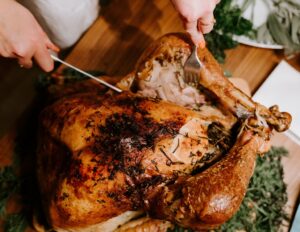
In my home, my mother not only baked the turkey but did all the work of slicing and picking the meat off the bones and piling it high on a platter. We could easily make our choice of white or dark pieces and fork it onto our plates. Along with it were plenteous amounts of stuffing, mashed potatoes, gravy, homemade noodles, vegetables, cranberry sauce—and always homemade pumpkin pie slathered with whipped cream. We inevitably stuffed ourselves. Delicious to the palate, but not so good for the digestive system or the waistline.
The typical Thanksgiving feast brings thoughts to my mind of a king’s table laden with the richest of foods. Only the best for those deemed worthy enough to be invited to his table. There would be family, close advisors, perhaps bodyguards. They would partake of copious amounts of perfectly prepared foods in the presence of the king.

Jesus, the King of all kings (1 Timothy 6:15), invites us—invites you—to “come and dine” with him (John 21:12, KJV). “The Lord Almighty will prepare a feast of rich food for all peoples, a banquet of aged wine—the best of meats and the finest of wines” (Isaiah 25:6). Although Isaiah was prophesying about the wedding banquet of the Lamb (Jesus) at the end of time, figuratively Jesus sits at a table now, waiting for us to accept his invitation to come and dine.
The King’s table is lavished with every spiritual food we need and want. In both the Old and New Testaments, we are provided pictures of some of the King’s bill of fare.
When we approach the table, our first offering is salvation on a silver platter. God rejected King Saul for disobedience and replaced him with David. As was the custom, all Saul’s family was killed—except for Mephibosheth, his grandson, who was hidden away. Mephibosheth’s father had been a dear friend of David’s. When Mephibosheth was found, he was brought before King David. He expected death, referring to himself as “a dead dog” (2 Samuel 9:8), but instead received a gracious invitation to dine with the king.
All are invited to dine with Jesus. It is not based on anything we do or are, but only on our worth in his eyes.
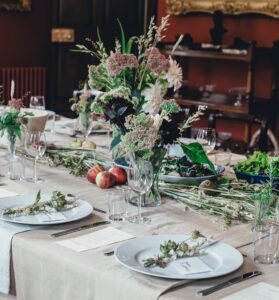
If we partake of this first dish, it is followed immediately by adoption presented on a family heirloom plate. Mephibosheth was not only spared his life, but he would always eat “at David’s table like one of the king’s sons” (2 Samuel 9:11).
We also will find adoption, into God’s family, and will have a permanent place around the King’s table.
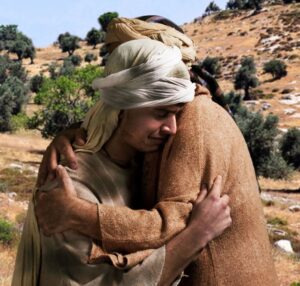
A bowl of unlimited forgiveness will always be within reach. The younger son of a man left home with his inheritance and squandered it in wild living. Realizing his sinfulness and unworthiness, he returned home and was welcomed into his father’s open arms. His father had a feast prepared to celebrate his son’s return. The table was set with all he owned (Luke 15:11-24). We can be sure that surrounding the bowls of forgiveness were plates of love, compassion, and acceptance.

The sweet aromas of restoration and hope waft from other dishes. These were once served on the sandy table Jesus set for Peter and six other disciples on the shore of the Sea of Galilee. It was after Peter had denied knowing Jesus, the other disciples had scattered, and Jesus had been crucified and resurrected. It was a moving scene as the disciples recognized Jesus from their boat and clambered to shore to share the healing meal he had prepared for them (John 21: 1-14). At the seaside table, they left their shame and failures behind for second chances.
Safety is served at the King’s table. A host in ancient Near Eastern culture would protect his guests at any cost. It didn’t matter what dangers were near. David said of the Lord, “You prepare a table before me in the presence of my enemies” (Psalm 23:5). There is nothing to fear as we dine at the King’s table.
Other dishes of rich food are always set out. There is mercy (“God, who is rich in mercy” – Ephesians 2:4); grace (“incomparable riches of his grace” – Ephesians 2:7); wisdom and knowledge (“Oh, the depth of the riches of the wisdom and knowledge of God!” – Romans 11:33). These and trays of so many other mouthwatering selections cover the bounteous table.
I’ve saved the absolute best part of the meal until now, although it is the first thing we notice as we come to the table. The host himself, Jesus, captures our attention. He is full of goodness, and from him comes all the bounty spread before us.
Ruth was a foreigner, a Moabite, gleaning in the barley fields of Boaz. At mealtime, Boaz invited her to his table. He sat with her and personally offered his food to her and asked her not to go anywhere else. She was in awe at the favor he showed her (Ruth 2:1-14). Boaz represents Christ. Like Ruth, we can’t help being in awe in the presence of Jesus.
Communion is also served at the table because everyone gathered has come for the same purpose. We share our adoration for our King and a thirst to know him better. Realizing we also share the same needs, we leave our differences behind and partake of fellowship.
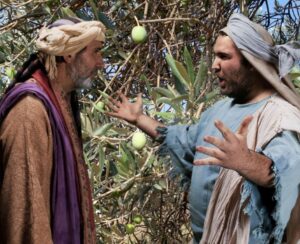
The young man who squandered his inheritance and returned home to a celebratory feast had an older brother. He was invited to dine at his father’s table, too, but he “became angry and refused to go in” (Luke 15:28). We are not told if he may have simmered down, realized his grave error, and accepted his father’s invitation. Not everyone invited to the King’s table accepts the invitation. Will you?

Regardless of what invitations you have received or extended this Thanksgiving or what your everyday family table looks like, you have an open invitation to the King’s table. He deems you worthy to dine with him continuously. The serving dishes are always full of everything you require to know him better, to grow in his character, and to live for him.
Unlike the food we are likely to gorge on during the holidays, the King’s offerings will never be harmful to our waistline. But if we refuse his invitation, we are sure to suffer spiritual malnutrition.
Scripture quotations are from NIV unless otherwise noted.
Feature photo by Christopher Ryan on Unsplash

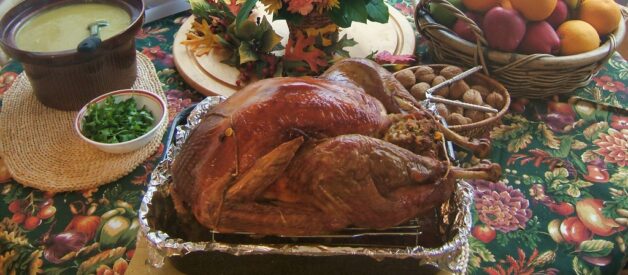
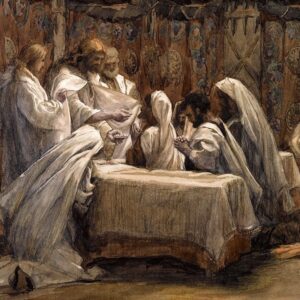


Brenda+Murphy
November 13, 2023That is a rich feast indeed! And it’s not a once-a-year feast, it’s spread before us all year long. What an amazing God to love us so much. ❤️
bspencer
November 13, 2023Yes, great for hearty appetites. And we can linger around the table in the presence of Jesus as long as we want. That’s the real treat!
Thanks, Brenda.